-
Are Dental Implants Right for You?
Your dentist may recommend that you get dental implants near Bel Air, MD if you have undergone a tooth extraction, have a severely chipped tooth, or are missing one or more teeth. Dental implants are a safe, effective cosmetic dentistry alternative to dentures and dental bridges. Here is a look at some of the reasons that you may want to discuss dental implants with your dentist.
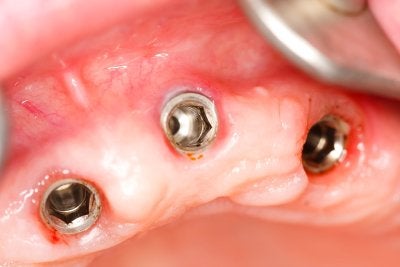
You are missing one or more teeth.
Your dentist can replace one or more missing teeth via a relatively simple cosmetic dentistry procedure using dental implants. A dental implant is a prosthetic tooth that is attached to a titanium rod that is implanted directly into your jawbone. The prosthetic tooth can be customized to match the size, shape, and color of your remaining natural teeth. This means that it looks almost unnoticeable when you talk and smile.
You are looking for an alternative to dentures or a dental bridge
Dentures and dental bridges are other cosmetic dentistry options that can be used to repair a chipped tooth or replace missing teeth. If you are missing all of your teeth, your dentist will recommend that you receive dentures. However, if you are only missing one or two teeth, dental implants are a better cosmetic dentistry solution. Because dental implants are anchored to the jawbone, they prevent many dental problems associated with missing teeth. Dental implants will ensure that you don’t suffer from jawbone loss, shifting teeth, or facial deformity. Dentures are not anchored to the jawbone, and thus do not prevent these problems.
You are in good physical health and committed to future dental care.
Your dentist will determine if you are a good candidate for dental implants. To be a good candidate, you must be committed to maintaining your future dental care. You will need to brush, floss, and use mouthwash at home. You must also visit your dental clinic at least every six months for dental cleanings and exams. You may not be a good candidate for dental implants if you have severe bone loss or advanced gum disease, smoke regularly, or have certain existing medical conditions.
-
The Uses of Dental Crowns
Do you need dental crowns in Bel Air, MD ? Dental crowns help restore teeth that cannot undergo other common forms of dental work, such as fillings. Crowns act as a protective layer around the tooth, strengthening its structure and upholding its original form. There are several different types of crowns available, including those made from a tooth-colored porcelain material. Talk to your dentist about getting a customized porcelain crown made for your tooth if you dislike the look of gold crowns.
Your dentist may recommend that you get a dental crown for several reasons. Typically, dental crowns are recommended for those who have a decayed tooth with fragmented or large fillings. Dental crowns are also used on teeth that have root canals. Finally, customized porcelain dental crowns may be used for cosmetic purposes.
The procedure for getting a dental crown will usually involve two appointments at a dental clinic. The first appointment centers around making accurate impressions of your tooth in order to create a custom crown that will fit perfectly over it. At your second appointment, your dentist will mount the permanent crown onto your tooth.
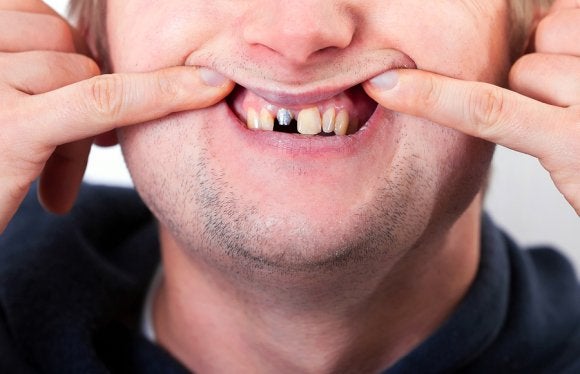
-
Choosing a Mouth-Healthy Diet
One of the most important things you can do to maintain proper dental care in Bel Air, MD is to eat nutritious foods that improve your oral health rather than detract from it. Your dentist has probably stressed the importance of maintaining a proper oral hygiene routine to avoid tooth decay and the need for tooth extraction. Your meal and snack choices are just as important as brushing and flossing when it comes to maintaining oral health. Keep reading to learn more about choosing foods that are healthy for your whole body—including your teeth.
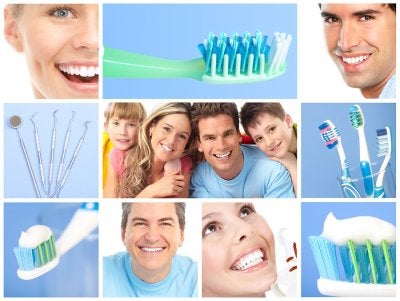
The Relationship between Sugar and Tooth Decay
Tooth decay occurs when the plaque that builds up around your teeth and mouth comes into contact with sugar from the foods that you eat. This interaction can cause acid to eat away at the teeth, forming harmful cavities. Eating a non-nutritious diet high in sugary foods can even affect your immune system, making it more difficult for your body to fight off infection and leading to oral health conditions such as gingivitis, advanced periodontal disease, and eventual tooth loss. Fortunately, tooth decay is preventable. In addition to a good dental care regimen including brushing your teeth with a fluoride toothpaste twice daily, flossing every day, and making regular visits to a dentist, you should eat a healthy diet and avoid added sugars in order to help keep your teeth and gums clean and healthy.
How to Choose Nutritious Foods
In order to choose nutritious foods for a healthy diet, be sure to read the nutrition facts and ingredients list for all processed foods that you purchase. This will help you avoid choosing products that are high in hidden sugars and that may not provide you with many vitamins or minerals. The most obvious culprits are candy, cookies, and pastries. Don’t forget to take into account what you drink as well. Soft drinks and juices typically contain an abundance of added sugar, and even some dairy products contain sugars that can cause tooth decay if they are consumed too often.
-
Proper Flossing Technique
Do you practice proper dental care in Bel Air, MD? Your dentist has probably told you that one of the most important parts of a healthy dental care routine is flossing daily. Be sure to use a proper flossing technique in order to avoid dangerous tooth decay.
Watch this video to learn the details about proper flossing technique. Wrap about 18 inches of floss between your two middle fingers. Then, gently insert the floss between your teeth, working it up and down against the surface of each tooth. Don’t forget to floss behind your back teeth, too! Ask your dentist or local dental clinic if you have any questions about flossing when you have dental work such as a dental bridge or orthodontic appliances.
-
Causes of Sensitive Teeth
Do you have sensitive teeth? You may need to make an emergency dental appointment with a dental clinic near Bel Air, MD to help find the root cause of your tooth pain. Read on to learn more about what your dentist might say is behind your current tooth sensitivity.

Tooth Sensitivity and Tooth Structure
In order to gain a better understanding of why your teeth have become sensitive, it’s important to first understand how the teeth are structured. The hard outer layer of your tooth is called tooth enamel. It protects the inside of your tooth, which mainly consists of dentin, a tissue filled with small tubes containing microscopic nerve endings. Your teeth may become sensitive when your tooth enamel is worn down, exposing the nerve-filled dentin below. This can potentially be very painful, especially when you eat foods that are hot, cold, acidic, or sticky.
Tooth Sensitivity and Dental Issues
Several different dental issues can cause your tooth enamel to become worn down and eroded. Even using a hard toothbrush during your daily dental care routine and brushing too aggressively can weaken your tooth enamel. Likewise, grinding your teeth at night can also damage tooth enamel. Ask your dentist to check for signs of grinding and excessive wear patterns on your teeth; he or she may recommend using a mouth guard at night so that the problem does not become exacerbated.
Tooth Sensitivity and Diet
If you tend to consume highly acidic foods and drinks, such as sodas and certain fruits, you may also be weakening your tooth enamel. Limit your intake of acidic foods and aim to brush after meals to get rid of leftover acid in your mouth. Finally, tooth decay, damaged fillings, and broken or chipped teeth can expose your tooth dentin—as can gum recession. Your dentist should be able to locate and repair broken dental work that may be causing your tooth sensitivity. As for gum recession, it’s important to maintain a proper daily dental hygiene routine in order to prevent additional gum recession and the pain that goes along with it.
-
What to Do About a Chipped Tooth
If you have a chipped tooth in Bel Air, MD, your first step should be to contact your dentist. A chipped, cracked, or knocked-out tooth is one of the most common dental emergencies . While a minor chipped tooth may not initially be accompanied by any adverse symptoms, chipped teeth can result in severe tooth pain or sensitivity. Even teeth that do not appear to be damaged can cause major health problems if left untreated. Keep reading to learn more about what you should do about a chipped tooth, including immediate care, professional care, and follow-up care.
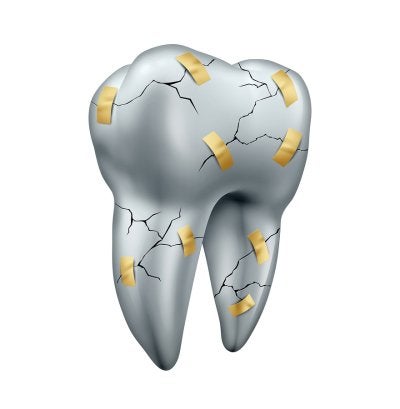
Immediate Care
Even before you contact your dentist, you should rinse your mouth with warm water. After you chip a tooth in an accident or fall, bacteria and dirt can enter your mouth. Simply rinsing the affected area goes a long way toward preventing infection. If your mouth is bleeding, apply a clean piece of gauze and press firmly until the bleeding stops. If you cannot get in to your dental clinic on the day of the accident, purchase dental cement from your local drugstore to seal the tooth.
Professional Care
Depending on the size and severity of the chip, your dentist has many options for fixing your chipped tooth. If the chip is extremely small, a dentist may simply smooth and polish the affected area. If your tooth enamel has been damaged and the chip is visible to the naked eye, your dentists may use a filling, dental crown, or cap to restore the look and function of your tooth. If you have severely compromised the tooth structure, you may need a root canal to remove the infected inner tooth pulp.
Follow-Up Care
Follow-up care for your chipped tooth is highly dependent on your dentist’s recommendations. If you have had a root canal or need a prosthetic device like a crown or bridge, your dentist will give you exact instructions on how to care for your restoration and ward off infection. Regardless of your treatment plan, it is essential to maintain proper oral hygiene after chipping a tooth.
-
What to Expect When You’re Getting Dentures
Are you considering visiting your dentist in Bel Air, MD for dentures ? As one of the most common techniques in cosmetic dentistry, dentists have relied on dentures to restore missing teeth for decades.
When you visit your dentist for dentures, you can expect to completely restore your smile. If you are missing many teeth, you may feel understandably insecure. Missing teeth can make it difficult or even impossible to properly speak or eat. Additionally, having a full set of teeth is essential to your oral health and good dental care. With dentures, you can preserve existing healthy jawbone and maintain your face shape and structure. When you visit your dentist, he or she will first determine if you need complete dentures or partial dentures. Complete dentures are for patients who are missing all of their natural teeth. Conversely, a partial denture fills in spaces where multiple teeth are missing. Your dentist will also determine if you can have your dentures created right away or if you need to have your few remaining teeth pulled. In that case, your gums will need to heal before you can wear your new dentures.
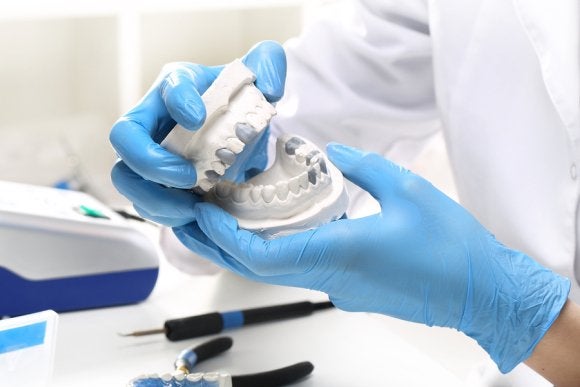
-
Say No to Smokeless Tobacco
Good dental care in Bel Air, MD , involves quitting bad habits that damage your teeth. Speak to your dentist and watch this video to learn why even smokeless tobacco can compromise your oral health.
If you smoke cigarettes, your dentist has probably already advised you that quitting now will substantially decrease your risk for oral cancer, gum disease, and tooth decay. However, a dental clinic also regularly cautions patients that chewing tobacco places you at just as high of a risk for developing oral cancer as do cigarettes and cigars. Dentists have also linked chewing tobacco to bad breath, tooth discoloration, cavities, and a decreased sense of taste and smell.
-
How to Take Care of Invisalign
After you visit your dentist in Bel Air, MD for Invisalign it is important to follow his or her instructions so you get the best results possible. Invisalign has helped millions of teens and adults achieve the smiles of their dreams. With Invisalign, you and your dentist can correct almost any alignment issues, including gapped, overlapping, overcrowded, and widely spaced teeth. Continue reading to learn about Invisalign care, including proper brushing, simple cleaning, and essential check-ups.
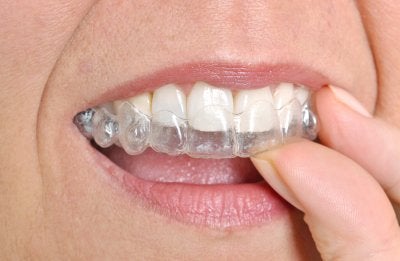
Proper Brushing
The best way to take care of your teeth when you wear Invisalign is by brushing and flossing regularly. As your dentist will tell you, maintaining superior oral health is key to the success of your Invisalign treatment. Simply remove your clear plastic aligners and brush and floss as you normally would. Good dental care mandates brushing teeth twice per day with fluoride toothpaste. You should also floss before bed with an ADA-approved dental floss.
Simple Cleaning
Dental care for your Invisalign aligners is simple. You can brush and rinse your clear plastic aligners in lukewarm water. You can also invest in an Invisalign professional cleaning kit for the best possible results. The Invisalign cleaning system uses special cleaning crystals to ensure that all plaque is eliminated from your aligners. If this sticky bacterial film is allowed to accumulate, it can cause gum disease and tooth decay. With the cleaning system, you simply soak aligners for fifteen minutes before popping them back in.
Essential Check-Ups
Invisalign care also involves visiting your dentists for regular check-ups. Only dentists have the professional tools necessary to completely eliminate plaque and tartar from your teeth and gums. Before your teeth have been straightened with Invisalign, it can be difficult to reach spots where teeth overlap using just your toothbrush. Your dentist will ensure that you maintain good oral hygiene and that your Invisalign treatment is progressing properly. You should schedule teeth cleanings twice per year and also make sure to visit your dentist every two weeks to pick up a new set of aligners.
-
Your Guide to Lumineers
If you feel insecure about your smile , your dentist in Bel Air, MD, may have suggested Lumineers. Lumineers are porcelain veneers that are designed to treat a wide range of problems in cosmetic dentistry. With Lumineers, your dentist can help you achieve whiter and perfectly aligned teeth. If you want to achieve the smile of your dreams, talk to your dentist about porcelain veneers. Keep reading to answer some frequently asked questions about how Lumineers work.
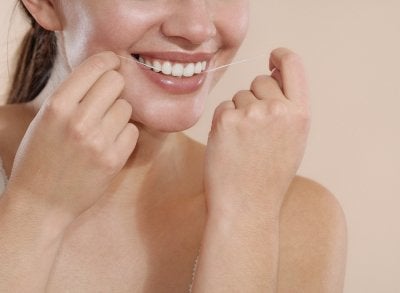
What Are Lumineers?
Lumineers are tooth-colored sheaths that fit completely over the fronts of teeth. These veneers are crafted from thin porcelain that can be matched exactly to surrounding teeth. Unlike traditional veneers, which can be thick and require a dentist to remove surrounding tooth structure, Lumineers are digitally designed to be ultra-thin. Lumineers have about the thickness of average contact lenses, so they can be placed precisely over teeth and blend in seamlessly with your smile.
What Kinds of Problems Do Lumineers Correct?
Dentists use Lumineers to correct many cosmetic problems. Lumineers can completely cover a chipped or cracked tooth. Because Lumineers can be crafted from any color, they can also mask even the darkest tooth discolorations. If your teeth are dark or yellow due to age, medications, smoking cigarettes, or years of drinking coffee and wine, Lumineers are the best way to achieve a whiter smile. While teeth whitening is also successful for many people, even teeth whitening cannot correct deep, internal stains as Lumineers can. These porcelain veneers mask any imperfections, which means they can also correct misaligned, gapped, or overlapping teeth.
How Does the Lumineers Procedure Work?
If you decide to invest in Lumineers, your dentist will first meet with you to discuss your treatment plan. You can decide to achieve a whiter, better aligned smile with just one Lumineer or with a full set of Lumineers that covers all your teeth. During your first visit, your dentist will create a customized mold of your teeth. After that, your porcelain veneers are custom-made in a laboratory. Dentists can place a complete set of Lumineers in just one quick and painless visit.
RECENT POSTS
categories
- Uncategorized
- General Dentistry
- Toothache
- Emergency Dentistry
- Family Dentistry
- Receding Gums
- Cosmetic Dentistry
- Veneers
- Gum Disease
- Gingivitis
- Dental Crowns
- Orthodontics
- Dental Implants
- Root Canal
- Wisdom Teeth
- Teeth Whitening
- Your Smile
- Composite Fillings
- Lumineers
- Dentures
- Invisalign
- BrightSmile
- Dental Bridge
- Abscessed Tooth
- Sealants
